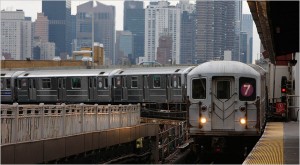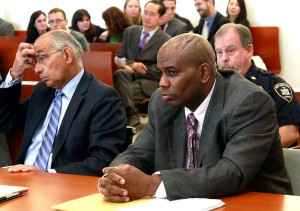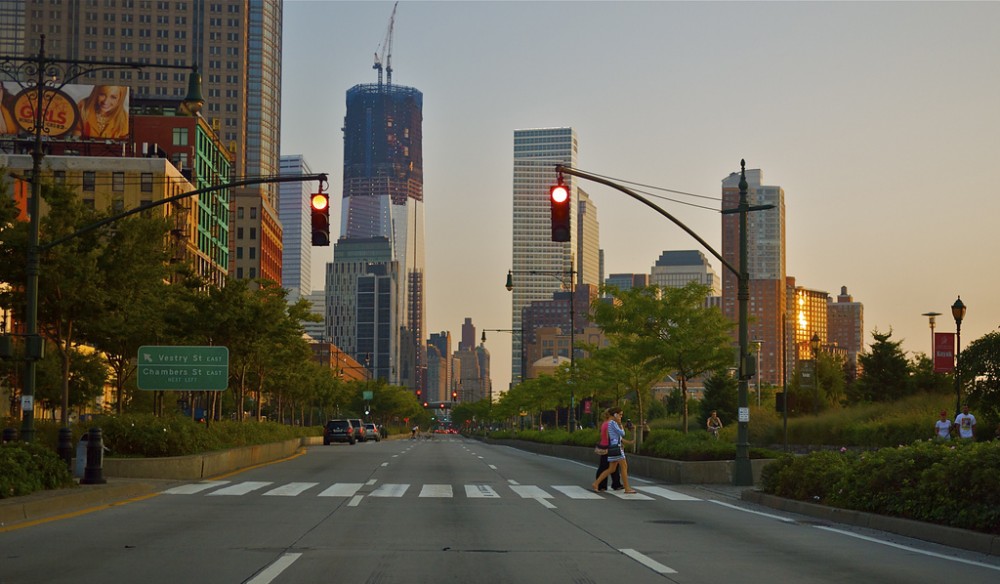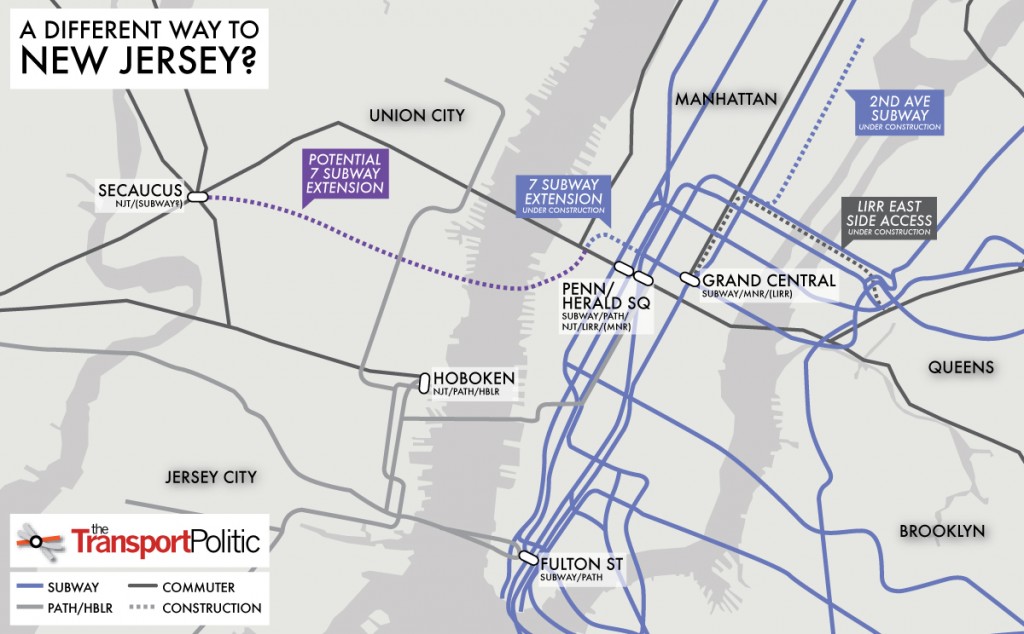I have written a comprehensive report for my Sustainable Transportation course at Lafayette College that answers the question on why we have not built a new crossing linking Manhattan and New Jersey. This was a project assigned to our class addressing transportation issues in the United States. Being from New York City, I chose this topic because I wanted to know why I have to wait in traffic for up to an hour on the approaches to any of the existing crossings. What I have discovered and written explains the social, political and economic attitudes that stagnated the highway growth in the New York Metro Area after the expansion of the George Washington Bridge. It will also give insight on the future of crossing the Hudson River. The PowerPoint associated with it will be posted soon.
Monthly Archives: December 2012
New Hudson River Crossing in New York City? Part II
 Many proposals in the last half decade have been dreamed and/or stopped dead in its tracks to construct a new Hudson River crossing connecting Manhattan and New Jersey. One of them is the ARC Tunnel which was cancelled by New Jersey Governor Chris Christie in 2010 because of its spiraling out of control costs. Subsequently, Mayor Bloomberg of New York City silently instructed municipal staff to begin studying the possibility of stretching the city’s subway system into the state across the Hudson River.
Many proposals in the last half decade have been dreamed and/or stopped dead in its tracks to construct a new Hudson River crossing connecting Manhattan and New Jersey. One of them is the ARC Tunnel which was cancelled by New Jersey Governor Chris Christie in 2010 because of its spiraling out of control costs. Subsequently, Mayor Bloomberg of New York City silently instructed municipal staff to begin studying the possibility of stretching the city’s subway system into the state across the Hudson River.
The 7 Train was the prime candidate in this proposal. It would be extended about four miles westward to Secaucus Junction where a major hub for NJ Transit trains already exists. With an estimated cost of $5.3 billion, this is almost half the cost of the cancelled ARC Tunnel proposal of $11 billion. The explanation for this is that there are already existing tunnels that the 7 Line runs through in Manhattan that this new Hudson River tunnel would connect to; the ARC Tunnel did not have this advantage as major tunneling would have to be done underneath the streets of Manhattan.
The conception of this new plan is unique because it would be the first subway to go outside New York City’s borders. It would connect New Jersians to Times Square, and Grand Central Terminal, both major train hubs. This plan is brilliant because it costs half as much and would relieve congestion on existing Amtrak, NJ Transit and PATH trains. It would provide more capacity and spur development of areas in Manhattan and New Jersey it runs through.
Extending the 7 Line across the Hudson River to New Jersey should be high priority for the two states. It is widely known that we need to build additional crossings from Manhattan to New Jersey and when there is something available at a bargain compared to other proposals, we should take it.
Source: http://www.thetransportpolitic.com/2010/11/17/to-replace-the-arc-tunnel-a-subway-extension-to-new-jersey/
Source: http://www.nytimes.com/2010/11/17/nyregion/17tunnel.html?_r=1&hp
Sleepy Drivers

Ophadell Williams, right, the driver of a bus that crashed last year, killing 15 passengers, sat with his lawyer Patrick L. Bruno at the start of his trial in September (NY Times).
In a study published this week in the British Journal Occupational and Environmental Medicine, researchers in Australia and New Zealand report that sleep deprivation can have some of the same hazardous effects as being drunk. Getting less than 6 hours a night can affect coordination, reaction time and judgment, they said, posing “a very serious risk.” The study also said 16 to 60 percent of road accidents involve sleep deprivation. Currently, a Bronx prosecutor is trying to convict Ophadell Williams of manslaughter and criminally negligent homicide for falling asleep at the wheel of a bus that crashed and killed 15 passengers.
No state has laws regarding how much sleep one must get before they can drive making this a tough case for the prosecutor. However, if there were laws on this subject, how many hours of sleep is insufficient to drive; 4 hours of sleep, 6 hours of sleep, or how about 18 hours in a 3 day period. It is grey area in respect to making a law for it.
Hypothetically speaking, if a law was present there would be a problem with determining if one is actually sleep deprived or not. There are no conclusive tests in the field that a police officer can use that determines whether an individual is sleep deprived similar to doing a BAC test for a suspected drunk driver.
In retrospect, this is becoming an increasing problem for the safety of motorists. About one in five adults according to the American Academy of Sleep Deprivation do not get enough sleep. This presents an extreme danger on the road. However, how are we to get around this? Americans are always in a hurry and tend to put sleep on the bottom of their priority list. I know I do as a college student. Coffee seems to be the solution to temporarily solve this quagmire, but does not do the job all the time.
I think we should consider such laws on our books only if we can reasonably assess what amounts to sleep deprivation; it must not be ambiguous. This will stop catastrophic accidents that Mr. Williams is supposedly responsible for and like in this video of a bus driver that fell asleep and hit many cars in front.
Source 1: http://articles.cnn.com/2000-09-20/health/sleep.deprivation_1_sleep-deprivation-impairment-researchers?_s=PM:HEALTH
Source 2: http://www.aasmnet.org/resources/factsheets/sleepdeprivation.pdf

